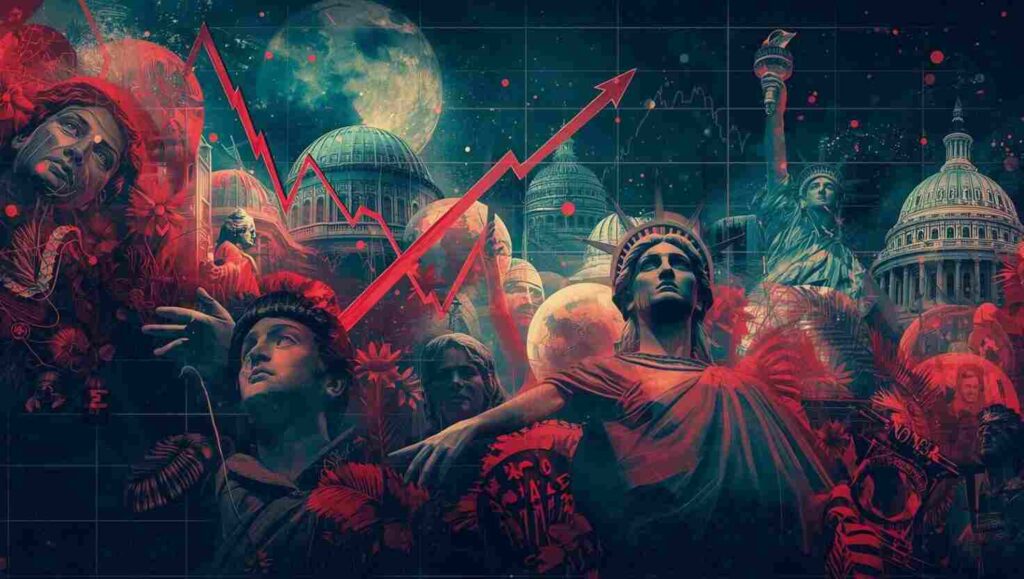Can a Government Shutdown Directly Cause a Recession in the U.S.?
Can a Government Shutdown Directly Cause a Recession in the U.S.?: When the federal government in the United States fails to pass the necessary spending bills, the result can be a government shutdown — a halt to many non-essential federal operations, furloughs of government employees, and delays in service delivery. But can such a shutdown, by itself, directly plunge the U.S. economy into a recession? The simple answer: not usually. The more nuanced answer: if it drags on long enough and is layered on top of other economic weaknesses, it could help trigger one.
US economy shutdown
US economy shutdown: A U.S. economy shutdown occurs when the federal government temporarily halts non-essential operations due to a lack of approved funding. This usually happens when Congress fails to pass a budget or a continuing resolution in time. During a shutdown, many government employees are furloughed, public services slow down, and economic activities take a hit — from delayed business permits to reduced consumer spending. While essential functions like national security and emergency services continue, prolonged shutdowns can disrupt markets, lower GDP growth, and shake investor confidence. Understanding the causes and effects of a U.S. economy shutdown helps individuals, businesses, and investors prepare for potential financial impacts and make informed decisions during periods of fiscal uncertainty.
Go to Homepage
What happens during a government shutdown?
Under law, when Congress does not approve appropriations (or a continuing resolution) the federal government must cease non-essential functions.
During a shutdown:
- Many federal employees are furloughed (temporarily laid off) or work without pay.
- Some agencies continue essential operations (e.g., air-traffic control, debt interest payments) while others shut down.
- Applications and approvals for things like small business loans, regulatory permits, and benefit processing can be delayed.
- It causes a reduction in federal discretionary spending — the government simply isn’t buying as many goods or contracting as many services.

So the immediate effect of a shutdown is a hit to federal-sector spending, reduced incomes (for furloughed workers), and possibly lower private-sector demand if those employees or contractors cut back.
Why most shutdowns don’t cause recessions ?
Historically, shutdowns have been relatively short-lived and the U.S. economy large and diversified enough that the damage remained modest. For example:
- Economists at Fidelity Investments note that although a shutdown can slow growth, “a government shutdown could be a small drag on the economy but not a devastating blow that would create a recession by itself.”
- A past long shutdown (35 days, 2018-19) cost roughly US $11 billion in real GDP loss, with only about $3 billion considered permanent.
- If the shutdown ends quickly and the economy is otherwise healthy, most of the lost output tends to be made up afterwards.

In effect: for a shutdown to directly cause a recession (typically defined as two consecutive quarters of falling real GDP), it would need to be severe, protracted, and take place when the economy has little resilience.
How a shutdown could tip the economy into a recession
While a short shutdown may just slow growth, under certain conditions it could serve as a trigger. Here are key channels and risk factors:
- Duration matters: The longer the shutdown continues, the greater the lost federal spending, payrolls, and contractor activity. According to analysts at Baker Institute, the risk of tipping into a recession grows if our economy is already shaky.
- Confidence & sentiment effects: Consumer spending makes up around 70 % of U.S. GDP. When households fear job loss or cutbacks, they reduce spending. A protracted shutdown can put a dent in consumer and business confidence.
- Spillovers into private sector: If government contractors lose work, or federal workers spend less, that reduces demand for private goods and services. If this feeds into layoffs, it can increase unemployment — a key marker of recession dynamics.
- Timing & underlying weakness: If the broader economy is already slowing (weak labour market, declining business investment, constrained consumer credit), the shutdown becomes a multiplier rather than a mere interruption. Some states, for example, were reportedly already facing downturns when a shutdown risk loomed.
In short: A shutdown by itself is likely a negative growth event, not a full recession. But if it drags on for weeks (rather than days) and occurs when growth is weak, it could contribute to a recession.
Final word
So, can a government shutdown directly cause a recession in the U.S.? Technically yes — but practically only under unusual and unfavourable conditions: a long-lasting shutdown, an already weak economy, and deep spill-over effects. In most cases, a shutdown is a drag on growth, not a full collapse into recession. For content creators, educators, or decision-makers, the key message is this: the risk is real, but it’s the duration and economic context that turn a “shutdown” into a “recession trigger.”
